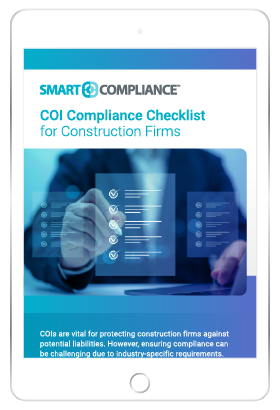Top COI Compliance Mistakes in Construction Projects and How to Avoid Them
The Importance of COI Compliance in Construction

In the construction industry, managing Certificates of Insurance (COIs) is crucial to ensure that every contractor, vendor, and subcontractor on-site has the proper coverage. A missed or incorrectly managed COI can expose your company to significant risks, including liability for accidents, fines, and project delays. Unfortunately, many construction companies struggle with COI compliance, often overlooking critical details that could protect them from potential lawsuits. In this blog, we will discuss the most common COI compliance mistakes in construction projects and how you can avoid them by using best practices and compliance automation tools.
The Most Common COI Compliance Mistakes in Construction
Managing multiple subcontractors and vendors often leads to administrative errors that expose construction companies to unnecessary liability. Below are the most frequent mistakes:
- Missing COI Renewal Deadlines: Many construction companies fail to track COI expiration dates properly, leading to periods where subcontractors work on-site without valid insurance. This exposes the company to liability risks if an accident occurs.
- Failing to Ensure All Subcontractors Are Covered: General contractors often overlook certain vendors or subcontractors, assuming they have coverage. However, if the proper COIs aren’t in place for every contractor on-site, the entire project is exposed to uninsured risk.
- Not Being Named as an Additional Insured: Simply holding a COI is not enough to ensure protection. If your company is not listed as an additional insured, you will not be covered in the event of an accident caused by a subcontractor. Without this extra layer of protection, your company could be responsible for damages.
- Keeping Outdated or Incorrect COIs on File: Construction companies often file expired or incorrect COIs. These outdated certificates provide no protection if an incident occurs, and if insurance details have changed or coverage has lapsed, it leaves the company exposed.
How to Avoid These COI Compliance Mistakes

To protect your company from compliance issues, follow these best practices to ensure all COIs are accurate, up to date, and properly managed:
- Automate COI Tracking: Relying on manual processes to track COIs is inefficient and prone to errors. By using compliance software like SmartCompliance, you can automate the process, ensuring that all COIs are tracked, renewed, and verified in real time. The software will flag missing or expired COIs and send automated renewal reminders to vendors and subcontractors.
- Set Renewal Reminders and Alerts: Don’t let COI renewals slip through the cracks. Use a system that sends automatic alerts before a COI expires, giving you enough time to follow up with vendors or subcontractors for updated certificates.
- Use a Centralized Compliance Dashboard: Keeping track of multiple COIs across various vendors is a difficult task. A centralized dashboard allows you to see the status of all certificates in one place, making it easy to identify expired or missing documentation at a glance.
- Check COIs Regularly: Even with automation, it’s essential to perform regular checks on all COIs to ensure that every subcontractor’s insurance remains valid throughout the project. Double-check that your company is listed as an additional insured on every relevant COI.
SmartCompliance for Construction Companies
At SmartCompliance, we understand the challenges construction companies face when it comes to managing COIs. Our software is specifically designed to automate COI tracking, ensuring that all subcontractors maintain valid and up-to-date insurance throughout your projects.
With SmartCompliance, you can:
- Automate COI tracking and renewal reminders.
- Use a centralized compliance dashboard to monitor all certificates.
- Receive custom alerts for missing or expired COIs.
- Ensure that your company is always listed as an additional insured on relevant policies.
By streamlining your COI management process, you can avoid compliance risks, reduce administrative tasks, and ensure that every contractor on your project site is covered.
Protect Your Construction Project with COI Automation
Managing COIs is one of the most critical aspects of protecting your construction company from liability and ensuring full compliance. Manual processes often lead to missed renewals, uninsured subcontractors, and outdated documents—all of which can leave your company vulnerable. By automating the COI process with SmartCompliance, you ensure that every vendor and subcontractor remains compliant throughout your project.
Want to learn how automation can protect your construction projects? Schedule a Free Demo today and see how SmartCompliance can help.



